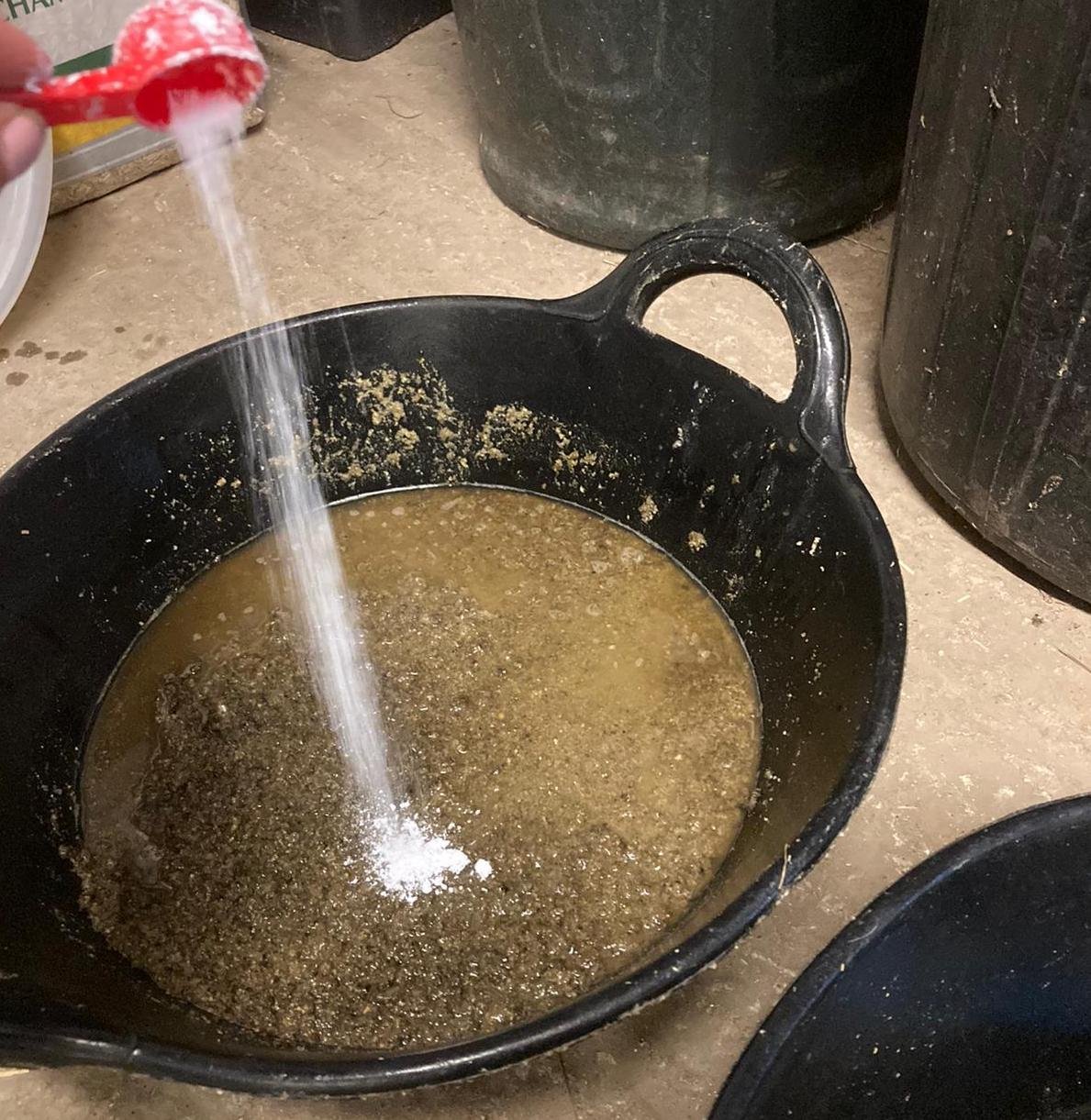How HISA has affected the marketing and selling of equine supplements - What trainers need to know
Article by Ken Snyder
In 1834, Thomas Day of Day & Sons in the UK. introduced Day’s Black Drink, an elixir for horses to relieve colic, chills, “low condition” and something called “gripes.” There is no record of the ingredients, and that is probably something best left unknown.
Black Drink was the first known supplement, or product made from natural, not synthetic, substances, as this was the early 19th century. So, too, is heroin derived from a natural substance—poppies. (Created from morphine in 1874, its use on the racetrack was prevalent enough in the early 20th century to help fix races that “horse” became slang for the narcotic in recent history.)
Supplements today range from useless and quackery to many that are considered effective in horse health care by many trainers on the racetrack. In fact, the majority of Thoroughbred trainers utilize supplements with feed.
Like therapeutic medications and illegal substances, dietary supplements are under the purview of the Horse Integrity and Safety Authority (HISA). Like their drug counterparts, HISA is instituting uniform regulations for supplements in all 50 states. The task falls specifically to the organization’s Horse Integrity and Welfare Unit (HIWU).
Good, bad, or indifferent, the intent of this organization, inarguably, is noble: to make racing safer and healthier for the horses.
Supplements, however, are seemingly lost in the fog in the scrutiny and attention paid to perhaps the biggest problem in horse racing: medications.
There are potential hazards with supplements, however, and uniform rules across all U.S. racing jurisdictions are in place just as with medications. The key regulation that is now applicable in every HISA jurisdiction specifies that “orally administered vitamins“ and “unsupplemented isotonic electrolyte solutions by oral or intravenous administration” may be administered up to 24 hours prior to post time. This may differ from prior state regulations.
Alexa Ravit, director of communications and outreach for HIWU, outlined the objectives of this regulation and all HISA “regs” in response to an email:
“HISA’s supplements-related regulations (and in particular addressing ‘drug claims’) are intended to protect horsemen from 1) fraudulent or unproven claims of effect; 2) the unknown safety risk to horses in administering these products; and 3) products where the risk of contaminants or unknown components is high due to lack of independent quality controls.”
The task of monitoring and regulating dietary supplements is not nearly as challenging as that for medications, but it is no slam-dunk either. Also, while medications and new withdrawal times for permitted drugs might be a trainer’s focus, trainers should know that, while supplements by and large are safe, there are things to watch for with their use.
In simplest terms, managing supplements for trainers under HISA/HIWU is following three steps: (1) reading labels (more on this below); (2) being careful in using dietary supplements in combination with approved medications; and (3) not accepting free supplements without understanding what’s on the label.
Mislabeled supplements, according to Rivet, are the major thing that can get a trainer and owner in trouble. She wrote, “If…the product’s labeling…includes a health or structure/function claim, the product is a drug, not a dietary supplement.” Also, drugs are FDA-approved and will carry that information on the label. Supplements won’t.
In short, trainers need to look first to make sure the supplement does not say “FDA approved.” Supplement labels also should not make “structure/function” claims. HIWU lists these examples:
− Decreases or prevents exercised-induced pulmonary hemorrhaging (EIPH)
− Prevents or treats gastric ulcers
− Manages pain caused by osteoarthritis
− Controls inflammatory airway disease
− Increases cardiac output
− Increases red blood cell production
The claims are definite, positive and apparently proven by results, warranting approval by the FDA.
Contrast these claims against what will be found for dietary supplements:
− Sustains lung health
− Maintains gastrointestinal health
− Supports heart health
− Supports bone strength
− Promotes healthy metabolism
− Replenishes electrolytes lost through exercise and sweating
Labels on dietary supplements sound good but stop short of making a promise and, in a couple of instances, are vague at best. “Sustains lung health” and “maintains gastrointestinal health” are things you would want a horse to have after lung or gut issues are solved, and maybe skate closest to a claim like a drug. What supports heart and bone health and strength, respectively, is anybody’s guess. The same goes for promotes healthy metabolism. (Maybe the label will tell one how.) Replenishes electrolytes is a straight-up promise that evidently is achieved with dietary supplements and not drugs. (Gatorade for humans comes to mind.)
To make another simple distinction, drugs are available only through a prescription from a veterinarian. If a trainer is getting them through another source, there’s potential trouble; but that’s for another story. Supplements are available in tack shops and/or online and do not require a veterinary prescription.
Ravit, in response to how common it is to see supplements making drug claims contrary to regulations, only said, “It cannot be quantified.” That’s “Governmentese” for “It’s anybody’s guess.”
HISA/HIWU’s own definition of a drug, by the way, is this:
“Under the Federal Food, Drug, and Cosmetic Act, the term “drug” means a product intended for use in the diagnosis, cure, mitigation, treatment, or prevention of disease, and articles other than food intended to affect the structure or any function of the body.” That’s a mouthful to say it ought to work.; you should get results.
In case you’re wondering why supplements are not regulated by the FDA, the category name “dietary supplements” gives you the answer. The FDA defines them as a “dietary ingredient intended to supplement the diet.” Dietary supplements are not regulated for humans either.
Are they safe? You would think, given the absence of regulation, the answer would be an automatic “yes.” The FDA, however, can take action to remove supplements from the market if they are adulterated (unsafe) or misbranded (misleading). Let the buyer beware.
What a trainer can control are things to avoid, such as mixing supplements with drugs, administering too many supplements, or substituting supplements for drugs altogether.
HIWU’s language on dietary supplements is actually a bit scary:
“It is…the responsibility of the manufacturer to ensure the product’s safety and to market the supplement in accordance with applicable law.“
The second part of the statement should give one pause. Yes, the manufacturer is responsible for the product’s safety, but it’s the trainer or trainer’s barn help that is the last person in the literal food chain for the horse. Once a supplement is in a trainer’s hands, he or she is on their own. The safe bet is a veterinarian’s assessment of any risks and/or benefits.
HIWU addresses this in their literature: “Supplements can interact with some medication with adverse health conditions” advising trainers to “be vigilant and discuss administration [of a supplement] with your veterinarian.”
Ravit also responded with “no comment“ to whether there have already been instances of a supplement producing a positive test for an illegal or controlled substance.
Practicing veterinarians like Dr. Rick Fischer, who has been on the racetrack for 53 years, is, as one would expect, well-versed in the difference between a drug and a supplement. He presents another issue that threatens the health and safety of horses. He and other vets are not always gatekeepers with supplements for trainers. Laymen or salesmen will approach trainers directly promoting supplements. “Worse than that, they’ll give them away: ‘Here are two gallons of this. Use it and see if you like it.’ You really don’t know what the hell you’re getting,” said Fischer.
There are other words on supplements to be mindful of. HIWU’s website warns that “’natural’ does not mean safe, nor does it mean that a product is free of Prohibited Substances. Neither do “seals of quality assurance” that guarantee a supplement is safe and effective. In short, even practicing veterinarians recommending supplements cannot guarantee safety or effectiveness.
Fischer said there have been instances where a supplement and an approved medication have produced positive tests for banned substances.
HIWU’s website advises, “It is crucial to have specialized knowledge from a chemical engineer or pharmacist in order to comprehend and forecast the resulting molecules, due to the intricate interplay between the chemicals involved.”
Fischer expounds on the “intricate interplay” thusly: “There’s been positive tests on things that I’ve never even heard of. It’s not something that anybody in their right mind would give a horse. But the chemical breakdown when they’re in combination…who knows?
“They’ll give you a list of all the different ingredients. Most of it is Greek to these guys and some of it is Greek to me, and I’ve been practicing for more than 50 years.”
Fischer actually parroted HIWU language in saying it would take a chemical engineer or pharmacist to be able to tell “if this molecule matches up with this molecule and what it’s going to come out as.“
Good luck to any trainer looking for a chemical engineer or pharmacist on the backside.
Dr. Day’s Black Drink, by the way, would not pass muster as a supplement as it claimed to treat colic. As for “gripes,” there is no supplement or drug for that.




